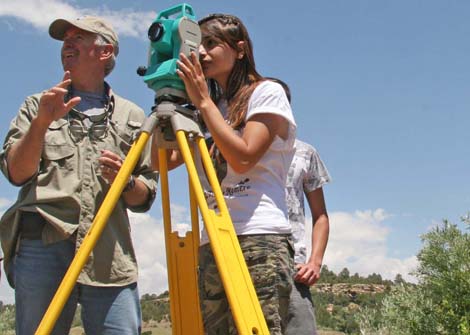High School Students Experience Hands-On Science Through Highlands Summer Immersion Program

Since 2007, high school students from Northeastern New Mexico have come to Highlands University for a free hands-on summer science immersion program aimed at increasing interest in science professions. This year the program runs June 7 — 18.
The learning is experiential with much of the time spent in fieldwork rather than classrooms.
The intensive two-week Science and Agriculture Summer Experience (SASE) program is funded through a United States Department of Agriculture – Hispanic Serving Institution grant Highlands University secured in 2007.
“A primary purpose of the program is to motivate students to major in STEM disciplines in college — science, technology, engineering and math,” said Edward Martinez, a natural resources professor who wrote the USDA grant and created the program.
“I tell the students, yes, it’s fun and interesting but it’s also demanding and you will be required to participate in all aspects of the curriculum,” Martinez said. “Science professors from Highlands teach the modules, and the rigor and content is at the college freshman level.”
Each year, students experience two learning modules. In 2007, the students studied water conservation and soil, in 2008 the topics were soil and GPS/GIS, and in 2009 they studied water conservation and GPS/GIS.
Martinez taught the learning modules along with geology professors Jennifer Lindline and Michael Petronis.
This summer, the focus is on environmental microbiology and ecosystem restoration. Biology professor Richard Plunkett and forestry professor Craig Conley are teaching the modules.
“For me, making science fun is an important goal of the program,” said Conley. “Learning to observe and interpret what you see is an important part of my ecosystem restoration module. The students also learn how to use state-of-the-art scientific instrumentation to gather and analyze data.”
The students are conducting fieldwork onsite at the 4,500-acre Wind River Ranch west of Watrous. The non-profit foundation for the ranch works to conserve wild landscapes through ecological restoration, research, and education.
“One of our missions is to get people interested in nature and how to restore health to the land,” said Brian Miller, executive director and wildlife biologist for Wind River Ranch.
“You can’t do that without young people on board through programs like SASE.”
Juan Jauregui, a May graduate of Robertson High School in Las Vegas, is participating in the Science and Agriculture Summer Experience this year.
“This program makes me value the ecosystem and the natural environment,” Jauregui said. “Last week we worked on soil and human health, and this week we’re working on river streambeds. It’s a pretty diverse program and the professors share a lot of information in two weeks. It’s also an opportunity to use high-tech instruments in fieldwork.”
Jauregui will attend Highlands University this fall and plans to major in forestry.
Since the SASE program started in 2007, students have given it high marks in surveys. One of the most significant findings is that an average of 80 percent reported that their overall impression of science is that it is exciting. Another key finding is that nearly 90 percent said they felt comfortable conducting field-science activities.
Martinez said the high school students stay in the university’s residence halls to experience, and get comfortable with, that aspect of college life.
“The students who participate don’t just grow in intellect and knowledge, they grow in maturity, responsibility and independence,” Martinez said. “I believe that the overall impact of the program is that it allows students to mature and develop so that they can be successful at the next level of their education. It serves as a transition from high school to college, especially for the seniors.”
Martinez said he is exploring other funding sources so the program can continue after the USDA grant ends this year.
